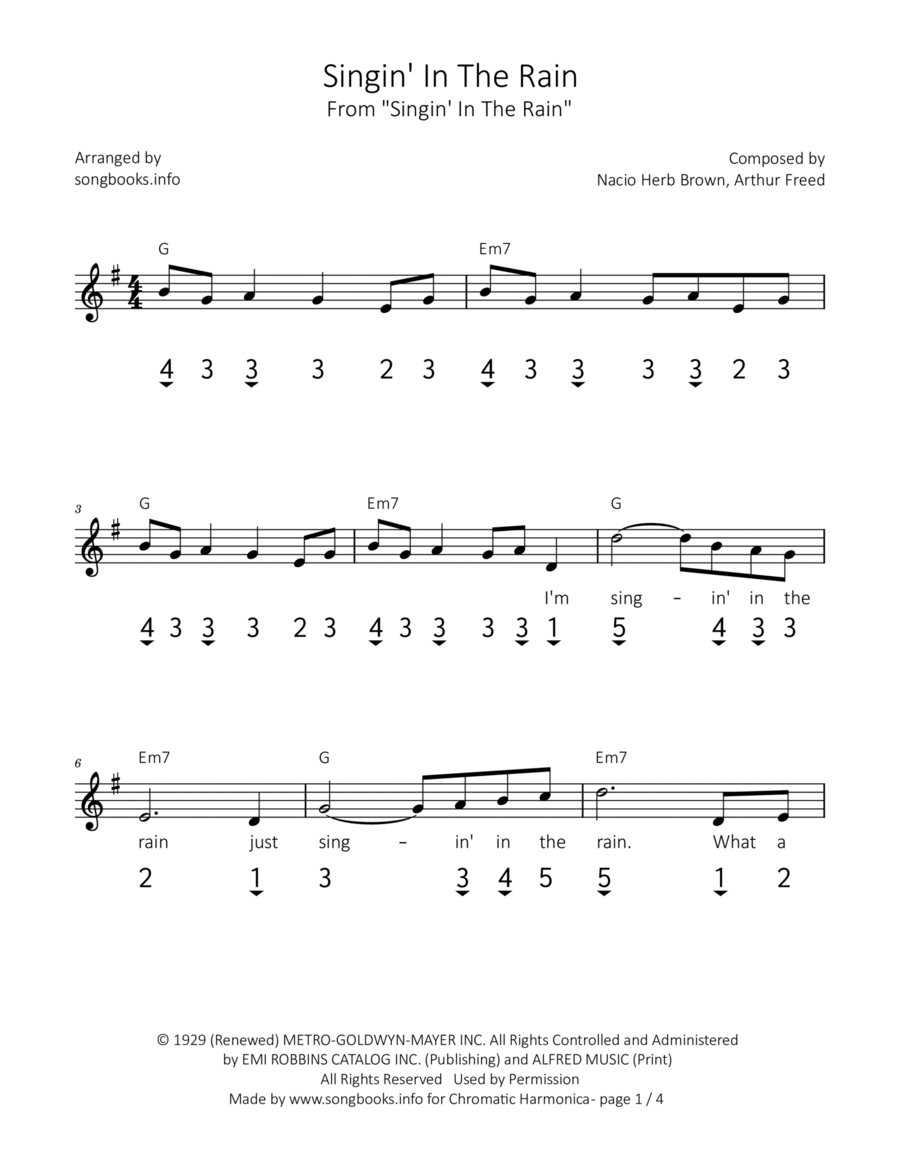Harmonica - Level 2 - Digital Download SKU: A0.1347194 Composed by Arthur Freed and Nacio Herb Brown. Arranged by songbooks.info. 20th Century,Broadway,Film/TV,Musical/Show,Standards. Score. 4 pages. Songbooks.info #931991. Published by songbooks.info (A0.1347194). Singin' in the Rain is a hit film written in 1929 by Arthur Freed (lyrics) and Nacio Herb Brown (music). Gene Kellys dances and sings in the 1952 sound film of the same name.Already after the Second World War, the song became a jazz standard and was performed by artists such as Dave Brubeck, Oscar Peterson, John Serry Sr., Sammy Davis Jr. and Doris Day, just to name a few artists. In 2004, the American Film Institute ranked the song third in its list of the 100 best American film songs.The song was adapted for the Chromatic Harmonica and provided with symbols for the channel number, blow/draw and the slider. These symbols are briefly explained in the appendix. The classic musical notation and/or the lyrics help to develop the song, so that even those unfamiliar with music notes can learn to play the song with this arrangement.The sound of a Vibraphone was used in the setting, so the sound does not mix with the sound of your own instrument. The melody is backed by a metronome and quietly by an organ. We hope you enjoy making music...!Singin‚Äô in the Rain ist ein 1929 geschriebener Filmschlager von Arthur Freed (Text) und Nacio Herb Brown (Musik). Gene Kellys tanzut und singt im gleichnamigen Tonfilm von 1952.Bereits nach dem zweiten Weltkrieg wurde der Song zum Jazzstandard und wurde von Interpreten wie Dave Brubeck, Oscar Peterson, John Serry senior, Sammy Davis jr. und Doris Day interpretiert, nur um einige K√ľnstler zu nennen. Vom American Film Institute wurde das Lied 2004 auf Platz 3 in die Liste der 100 besten US-amerikanischen Filmsongs gew√§hlt.Das Lied wurde f√ľr die Chromatische Mundharmonika adaptiert und mit Symbolen f√ľr Kanalnummer, Blas-/Ziehton und dem Schieber versehen. Diese Symbole werden im Anhang kurz erkl√§rt. Die klassische Notenschrift und/oder der Liedtext helfen beim Erarbeiten des Liedes, soda√ü auch Noten-Unkundige mit diesem Arrangement das Lied spielen lernen k√∂nnen.In der Vertonung wurde der Sound eines Vibraphones verwendet, so vermischt sich der Klang nicht mit dem Klang des eigenen Instrumentes. Hinterlegt ist die Melodie mit einem Metronom sowie leise mit einer Orgel. Wir w√ľnschen viel Spa√ü beim Musizieren...!
